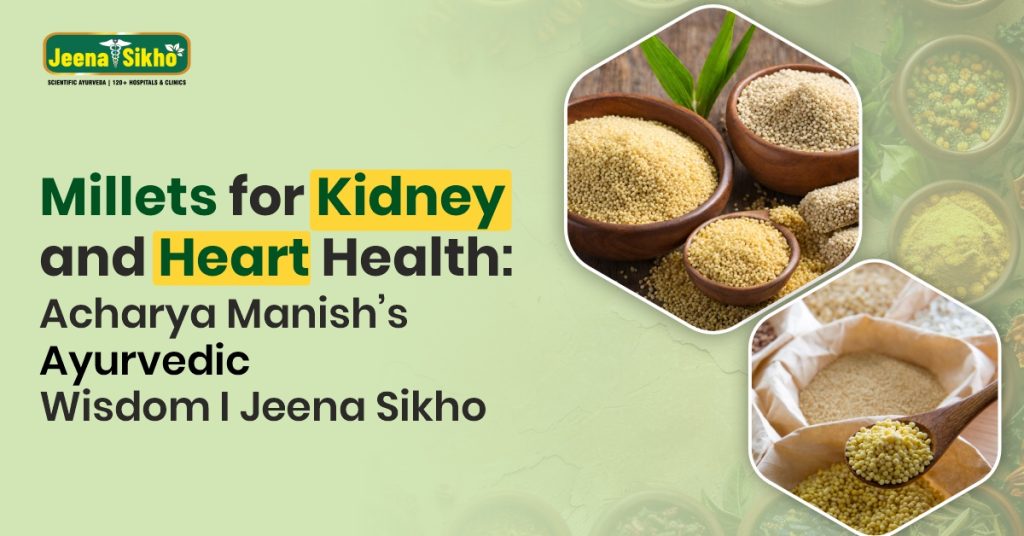Simple, natural foods significantly affect the body’s natural health. Millet is one such food that has been keeping the health of human beings for centuries. They are small grains high in nutrients, digest well, and are versatile for food preparation. Acharya Manish suggests consuming millets for kidney and heart health as a natural method to strengthen vital organs and overall well-being. Millets act mildly instead of refined foods, which tend to overwork our digestive system and body organs, keeping the body in balance. Millets are a safe and healthy product that offer Ayurvedic benefits of millets, including their nutritional value and capacity to maintain the liver and kidneys in an optimum condition. They also contain a lot of fibre, minerals, and antioxidants, which not only assist in digestion but also help control the level of sugar and cholesterol in the blood.
Why Millets Are Essential for Kidney and Heart Care
Millets contain a lot of fibre, minerals, and antioxidants. They help maintain healthy blood sugar levels, digestion, and oxidative stress. Such small grains benefit people who want to avoid kidney damage or allow their hearts to work. Their nutrient content is very high, and the glycaemic index is low, making them healthy for the young and the elderly due to their risk of kidney diseases or heart-related issues.
Acharya Manish suggests that millets for kidney and heart health will help people change their diet and lifestyle. Along with regular meals, millets are a natural, mildly nutritious food that keeps the glands sustained.
Ayurvedic Benefits of Millets
According to Ayurveda, each food possesses a particular property, or guna, which influences our body doshas (Vata, Pitta, and Kapha). The millets are said to be light, easy to digest, and cool, which aids in maintaining the balance of the body. The Ayurvedic benefits of millets are:
- Boosting metabolism and digestion.
- Diluting ama (toxins), which impacts the kidneys.
- Detoxification of the body.
- Getting stronger and more energetic.
Regularly using millets for kidney patients protects the kidney healthcare system and improves heart health; thus, it is a two-in-one nutritional food according to Ayurveda.
Best Millets for Kidney Health
All millets are not made equally. For kidney and heart support, certain varieties stand out:
- Foxtail Millet – Low in potassium, making it ideal for kidney care
- Barnyard Millet – Supports digestion and helps manage blood sugar.
- Finger Millet (Ragi) – Ragi is filled with calcium and antioxidants and is suitable for the heart.
- Little Millet –Easy to cook, easy on the kidneys.
- Pearl Millet (Bajra) –Improves stamina and cardiovascular activity.
The best millets for kidney health could be combined to maximise benefits without putting an undue strain on the organs. According to Acharya Manish ji, these millets can be added to everyday dishes like upma, porridge, and khichdi to create a nutritious and well-balanced meal.
Ayurvedic Benefits of Millets
Ayurveda says that food is medicine. Millets are known to be tridoshic; they balance the body’s three energies: Vata, Pitta, and Kapha. They are:
- Detoxifying: Helps in getting rid of toxins that have built up in the kidneys and liver.
- Anti-inflammatory: Lowers kidney and heart inflammation.
- Blood sugar stabilising: the risk of diabetes is decreased, and glucose is released gradually.
- Digestive support: The high fibre content enhances general health and gut motility.
- Rich in nutrients: Antioxidants, iron, potassium, and magnesium.
Incorporating millets for kidney and heart health supports long-term wellness, boosts immunity, and nourishes essential organs.
How Millets Support Liver and Kidney Function
The liver and the kidneys regulate the function of detoxification. Millet reduces oxidative stress on these organs because it is an easily digested grain high in antioxidants. Consuming millet regularly has health benefits:
- Better filtration: Assists the kidneys in getting rid of waste.
- Healthy metabolism: Aids in the breakdown of proteins and fats by the liver.
- Less strain on the organs: A low glycaemic index prevents an abrupt spike in blood sugar.
- Healthy heart function: Blood pressure is regulated by potassium and magnesium.
As a regular meal, Acharya Manish notes that even a small dose of millets will positively affect the body’s organs and vitality.
Tips for Including Millets in the Daily Diet
- Exchange rice with Foxtail or Kodo millet in meals.
- Little millet is used to make breakfast.
- Fermented millet meals will give stronger digestion.
- Ragi flour is used to make roti, or porridge.
- For added taste and nutrition, mix millets with herbs and vegetables.
The key is regularity. According to Ayurveda, a slight dietary change with time renders long-term outcomes.
Conclusion
Adding healthy food to the everyday routine, which is millet for kidney and heart health, is not simply a diet option but a move towards complete well-being. A traditional Ayurvedic superfood, millet has been used for centuries to support liver and kidney function and offer natural remedies for heart disease.
Under the guidance of Acharya Manish ji, with millets, a healthy lifestyle, and herbal remedies, anyone can strengthen their kidneys and care for their liver and heart without artificial methods.
Start today: Replace refined grains with millet, cultivate mindfulness, and embrace Ayurvedic principles for a longer and healthier lifespan.
FAQs:
Can millets improve kidney function?
Millets decrease the work of the kidneys and support natural detoxification.
Is it safe for heart patients to consume millet?
Millet no doubt helps regulate cholesterol and maintain heart health.
Which millet is ideal for beginners to use?
Foxtail millet can be cooked and digested easily and used daily.
Can kids eat millet every single day?
Millets are healthy, safe, and nutritious for growing children.
Do millet alternative drugs affect organ health?
Millets help support organ functioning but must be supplemented with professional health care.







